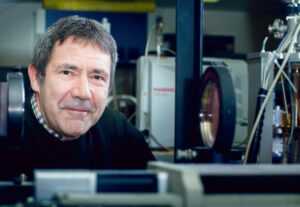U of L’s astrophysicists receive cold cash
By Jensen, Randy on August 19, 2020.
 David Naylor, a professor and Tier 1 Board of Governors' Research Chair in the Department of Physics & Astronomy who leads the AIG - University of Lethbridge photo
David Naylor, a professor and Tier 1 Board of Governors' Research Chair in the Department of Physics & Astronomy who leads the AIG - University of Lethbridge photoLETHBRIDGE HERALD
Thanks to a $250,000 grant from the Canada Foundation for Innovation (CFI) for research infrastructure, University of Lethbridge astrophysicists will develop a state-of-the-art cryogenic test facility to evaluate the performance of instruments destined for space exploration.
The Astronomical Instrumentation Group (AIG) at the U of L is poised to build a liquid-helium free cryostat and cryogenic translation stage that will be used to develop and test the world’s first cryogenic, far-infrared, post-dispersed, polarizing Fourier transform spectrometer. This new type of spectrometer has been identified by the world’s leading space agencies (ESA, JAXA, NASA) as a necessary next step to explore both galaxy evolution in the farthest reaches of the universe and star and planet formation in our own galaxy.
“The large facility cryostat (LFC), as it will be known, will be housed in Science Commons, and extends the capabilities of our group, positioning us to become the partner of choice with leading space agencies and scientific consortia,” says David Naylor, a professor and Tier 1 Board of Governors’ Research Chair in the Department of Physics & Astronomy who leads the AIG, in a news release.
More than half of the energy emitted by the universe falls in the far-infrared spectral region. Because the Earth’s atmosphere blocks this energy, the instruments must be placed in space. Furthermore, they must be cooled to extremely low temperatures to achieve the required sensitivity. The LFC will allow scientists to evaluate the performance of novel instrument concepts at extreme cryogenic temperatures. One exciting application is its potential role in lunar exploration.
“Most people don’t think about how cold the surface of the moon can get,” says Naylor. “With lunar night lasting a full 14 earth days, the temperature in some regions can plummet to 25 Kelvin, which is about -250 Celsius.”
With Canada a founding member of the international Lunar Gateway project, not only will Canadians set foot on the moon, but Canadian industry will develop hardware for deployment on the lunar surface.
“Any hardware, regardless of its type or application, must be proven to survive lunar night with limited resources,” says Naylor. “The LFC will be a unique facility in Canada, capable of simulating the hostile environment of the coldest parts of the lunar surface.”
“Not only will this infrastructure elevate our research, it will help us prepare the next generation of astrophysicists,” says Locke Spencer, a professor and Tier 2 Canada Research Chair in experimental astrophysics. “We will be able to offer our students, technicians and post-doctoral fellows highly specialized training in cryogenics, optics, electronics, mechanics, software development and project management.”
In addition to the $250,000 from the CFI, $360,000 has already been secured from four industrial partners, all active in the space exploration sector: ABB (Quebec City, Que.), Blue Sky Spectroscopy (Lethbridge), QMC Instruments (Cardiff, U.K.) and the Space Research Organization of the Netherlands (Groningen, the Netherlands).
The research team will apply for matching funds from the provincial government later this year, bringing the total value of this project to $860,000. The support from four industrial partners, the enhanced training opportunities provided by this facility and the provincial and national economic impact were highlighted in the review process. Five former AIG-trained students now work in the space sector, three of them with NASA.
12-11




